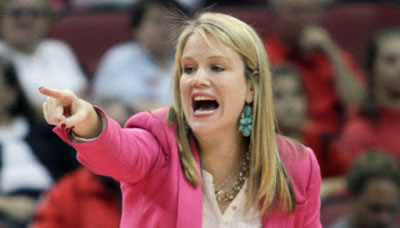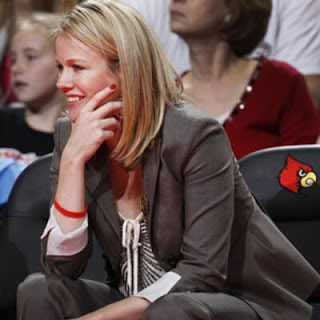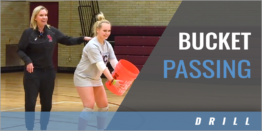|
Family Matters: Anne Kordes By: Kinda S. Lenberg Provided by: American Volleyball Coaches Association
Alas, the rest of us poor schlubs have to work somewhere else, dealing with everyday stress, trying to find affordable childcare, and having to make our own lunches. And, according to Rebecca J. Rosen, in her article titled, "America's Workers: Stressed Out,Overwhelmed, Totally Exhausted" (theatlantic.com, March 25, 2014), women aren't the only ones in distress.
"...I discovered soon enough these are hardly ‘mommy issues' – these are human issues, how we work and live, the pressures to spend so much time at work, or living up to crazy ideals, is affecting all of us." In addition, Rosen found, "...more young people don't see a way to combine work and family in a rational way, so are choosing not to have families." Rather than blame Google and Facebook (which are, as foundations of the Internet and social media, the ones making our lives more hectic and keeping us plugged in 24-7), we need to come together to find ways to make work and family life compatible. Especially for coaches. The AVCA is embarking on a new blog series titled "Family Matters," which will delve deeply into the psyche and actions of coaches at all levels – both male and female – who are struggling on a daily basis to balance their lives on the court with that in their own living rooms. Indeed, in America, this time struggle has been around since colonial times, but was thoroughly studied for the first time in 1973. "What has changed dramatically since early times, and even since 1973, though still in its infancy, is the emergence of ‘work and family' (W-F) as a defined and mainstreamed employment issue. It is no longer viewed as a problem limited to a small female labor force segment, families in poverty, or single parents who have no choice but to combine breadwinning with caregiving" ("Work and Family in America: Growing Tensions Between Employment Policy and a Transformed Workplace," Ellen Ernst Kossek, intra.krannert.purdue.edu, 5/10/06). In other words, it's all of us. During this fall women's volleyball season, the AVCA will highlight a number of coaches, picking their brains to find new and innovative ways to deal with the "W-F conundrum." The first blog focuses on Anne Kordes, recent AVCA President, and head women's volleyball coach at the University of Louisville, embarking on her fifth season at her alma mater in 2015. Coming from a storied volleyball coaching family (Anne's father, Ron, coached her at Assumption High School in Louisville), Kordes is definitely among the elite coaches in volleyball, with a career record of 223-96 (.699). Kordes also ranks 41st on the Division I volleyball winningest active coaches list. She has served as an assistant coach for the USA Volleyball Girls' Youth National Team, traveling to Baja California, Mexico, for the 2007 FIVB Girls' Youth National Championships. Then, in 2013, Kordes accomplished her principal goal – she became a mother. "I had a baby by myself," Kordes explains. "I was married awhile ago and when I got divorced, I knew honestly, for me personally, I wanted to be a mom very badly. I was terrified to get into a relationship simply to have a child with someone and not have it work out again. Divorce is very hard, and so after weighing the decision for a couple of years, I knew deep down in my heart there was no way I could not have a child. "Everybody has a different yearning – an instinctual need. There are a lot of us out there who want to be parents. There are also a lot of people out there who are surprised at how much they love being parents! For me it was never a take it or leave it situation. It was going to be one of those things that I think at the end of the day I would have been sick to my stomach not to have children simply because of my job. And if my job kept me from having children, I don't think I would be as good at it." To be sure, Kordes' parental situation is not all that unique in the 21st century, but it definitely comes with daily challenges that she has risen to the occasion to meet head-on. From financial aspects to time management, Kordes has some unique approaches to her personal W-F situation.
 http://louisvillewomensports.com/ "For me, personally, I have had to make some financial sacrifices to hire an au pair (a live-in nanny). I am single. I do this on my own, so I don't have a spouse, which is fine; but I certainly have to have live-in help. There is no doubt about it." To be sure, the au pair is vital to the successful management of the Kordes household, and is there to ensure Mary and Anne get to spend the most time possible together. ‘The other thing I found [that works well] is I have Mary in daycare two days a week to save the au pair's hours. Then the au pair travels with me and my daughter also goes with me everywhere on trips. Again, from a financial aspect, that kind of hurts because you have to pay for the care. However, for me the financial sacrifice it takes to make sure she is there is worth it." In fact, Mary has been traveling the country with Anne since she was a baby, and has been to numerous volleyball tournaments on recruiting trips. In an innovative move, Kordes would call the tournament director ahead of time and inquire about possible babysitters while she was at the competition scouting. Then, when she was in the gym from 7 a.m. to 8 p.m., Mary was with a reliable babysitter in the same building. "[At the recruiting tournaments,] I didn't take the au pair, just the baby, and I would go into a gym with 100 courts. I would be able to check in here and there [with the babysitter], but at the same time was able to bounce around to every court while recruiting." Of course, for Kordes, the best part was she got to take her daughter home with her every night. "I think one of the biggest issues we have [as coaches] is there are times in our jobs where we work seven days a week. I appreciate and love my job; however, I feel like if I didn't take [Mary] with me I would go long stretches without being able to see her and that would be too hard...for both of us." Another inventive approach Kordes has taken since the birth of her daughter has been simple: more effective time management. Her days start very early and often end rather late, but it is worth it. "The nice thing is I can get up early at 5 a.m. every day. That is where I found I have time when she is asleep and I am not worrying about her or I don't have to be anywhere. For me it is about getting up and starting my days much earlier than I ever have, which is great! By 7 a.m. I have done a lot and it is still early! "The nice part, too, is I can get home, feed her, play with her and put her down at around 8 or 8:30 p.m. and get work done on the computer at home." Finally, Kordes thinks the tide is changing for volleyball coaches, as there has been a decided increase in pay in coaching contracts over the last several years. Kordes truly believes changes for the better are coming down the pipeline – and coaches can make the most of the opportunity for their families. "I think we are seeing more salaries getting bumped up as volleyball continues to grow into a flagship program [on numerous campuses]." Especially for female coaches, the trend of higher salaries will make it easier to take those higher-profile jobs – while still being able to fulfill the parental role. "Female coaches sometimes get a bad rap," Kordes explains. "They are not known to pick up their families and move for the next good job. Female coaches tend to stay where they are. There are a lot of successful female coaches out there who aren't in the top jobs but the family is good and they are happy where they are." Now, Kordes explains, both male and female volleyball coaches can negotiate in their contracts to receive perks like money for family travel and daycare. As the sport continues to grow, so do the opportunities for coaches. And, according to Kordes, the W-F dynamic is something coaches need to spend time talking about. "A very healthy and smart thing to do is to discuss ways we can help [coaches with families] stay in coaching. Hopefully, people don't ever let the job be a reason not to pursue having children if that is what they really want and need in their lives."
|







